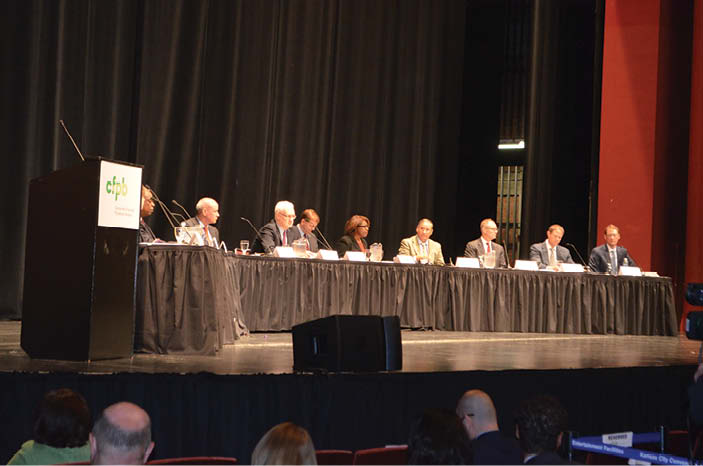
By Paul Thompson
Northeast News
June 8, 2016
KANSAS CITY, Missouri – Payday lending interest rates in Missouri have risen to an average of 455%, and you can count Kansas City, Missouri Mayor Sly James among those urging the Missouri Legislature to do something about it.
James served as the opening speaker for the Consumer Financial Protection Bureau’s (CFPB) public hearing and panel discussion on payday lending on Thursday, June 2 at Municipal Auditorium, where new rules were introduced that are designed to protect borrowers from the pitfalls of the payday lending industry. James spoke out harshly against the industry he says is draining $26 million per year from the Kansas City economy.
“In Missouri, there are more payday loan shops than Wal-Mart, Mcdonalds, and Starbucks stores combined,” said James. “Invariably, these proliferate in areas of town where residents are the most vulnerable and predominantly minority. That’s no accident.”
After James’ opening remarks, CFPB Director Richard Cordray laid out the tenets of a proposed rule from the agency that would tackle some of the most damaging payday lending practices.
“Specifically, lenders would need to verify the borrower’s income, borrowing history, and certain key applications,” said Cordray. “This will determine whether the borrower will have enough money to cover their basic living expenses and other obligations, and still pay off the loan when it is due without needing to re-borrow in the next 30 days.”
The proposed rules would also prevent payday lenders and the like from offering follow-up loans to consumers into perpetuity. Cordray noted that 80% of auto title loans, for instance, are rolled over on the day that they are due. Additionally, he added that 25% of all such loans ultimately result in a sequence of ten loans or more.
“Under this option, if a consumer cannot pay off the original debt entirely or returns to borrow within 30 days, a lender could offer no more than two extensions to the original loan, and then only if the consumer repays at least 1/3 of the principle with each extension,” explained Cordray. “To further safeguard against extended indebtedness, lenders could not offer this option to any consumer who’s been in debt over the preceding year on short-term loans lasting 90 days or more.”
Safeguards would also be installed to ensure that borrowers are able to pay the full principle of a loan while also meeting other basic living obligations. According to Cordray, this “full payment” test would not apply to installment loans that meet three main conditions.
“First, they must be for a term of no more than two years, and be repaid in roughly equal payments,” said Cordray. “Second, the total cost cannot exceed an all-in percentage rate of 36%, plus a reasonable origination fee. Third, the projected annual default rate on all of these loans must not exceed 5%.”
If that rate did climb over 5% in a given year, the lender would be obligated to refund the origination fees paid by all borrowers. Cordray acknowledged that the CFPB pulled some of the proposed new regulations from credit unions and other lending organizations that are already lending money in a responsible manner. He added that the Bureau’s intention isn’t to stifle lending for those organizations, but to emulate their successful lending practices.
“We do not intend to disrupt the basic underwriting approaches of any banks, credit unions, or traditional finance companies, as well as some newer entrants which offer installment loans in ways designed to ensure that consumers can afford repayment,” said Cordray. “We believe these lenders will have little difficulty adhering to our proposed rules.”
The rules would also aim to limit the access that payday lenders have to the bank accounts of borrowers. Cordray proposed making lenders give advanced notice before making an attempt to access the account of a borrower, in order to allow the consumer time to contest the transaction or make arrangements for payment. The rule would also propose a debit-attempt cutoff, which would cut off a lender from a borrower’s bank account after two consecutive unsuccessful debit attempts. After that, lenders would have to get new authorization for access to bank accounts. CFPB studies have shown that as many as half of online borrowers have had an overdraft or failed debit from a payday lender, and that up to 1/3 of those with failed payments wound up losing their bank accounts.
Proponents of the payday lending industry insist that these new rules will create a micro-lending void in communities that need quick access to credit. One panelist predicted that the CFPB rule would lead to loans of under $3,500 ceasing to exist, while another wondered what will replace payday lending after the Bureau regulates the industry out of existence.
For others, such as Mayor James, the prospect of a new rule proposed by the CFPB would be most effective if combined with greater oversight from the State Legislature.
“Our State Legislature has some responsibility to do something about it,” said James. “If desired, they can work with the CFPB to create a more just and transparent set of regulations to guide this industry. But before they do that, they have to understand what it means for a person to be caught in this cycle of endless debt and hopeless poverty.”
The CFPB is currently seeking input on the proposed new rules, with comments due by September 14, 2016. You can find out more about the proposed rule or offer your own feedback at the CFPB website, consumerfinance.gov.



















